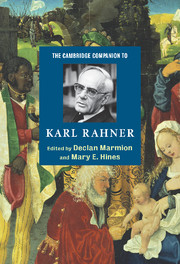Book contents
- Frontmatter
- Introduction
- Part I Spiritual, Philosophical, and Theological Roots
- Part II Theological Investigations
- 4 Method in theology
- 5 Revelation and faith
- 6 Trinity
- 7 Christology
- 8 Ecclesiology and ecumenism
- 9 Ministry and worship
- 10 Ethics
- 11 Eschatology
- Part III Conversations Ongoing
- Part IV Retrospect and Prospect
- Appendix
- Index
10 - Ethics
from Part II - Theological Investigations
Published online by Cambridge University Press: 28 May 2006
- Frontmatter
- Introduction
- Part I Spiritual, Philosophical, and Theological Roots
- Part II Theological Investigations
- 4 Method in theology
- 5 Revelation and faith
- 6 Trinity
- 7 Christology
- 8 Ecclesiology and ecumenism
- 9 Ministry and worship
- 10 Ethics
- 11 Eschatology
- Part III Conversations Ongoing
- Part IV Retrospect and Prospect
- Appendix
- Index
Summary
INTRODUCTION
The implications of Karl Rahner's theological project for ethics become clear when one considers that the concept of choice is at the heart of both his transcendental anthropology and the Ignatian spiritual tradition that so richly informs all of his theology. It would be a serious mistake, however, to view the Rahnerian concept of choice and the theology of freedom that supports it as the mere capacity to select among various objects. Choice in this account is correctly understood as “the possibility of saying yes or no to oneself, the possibility of deciding for or against oneself,” which is also always a decision for or against God.
For Rahner, then, the human person is that self-transcending spirit who in the act of knowing or willing implicitly experiences both itself as subject (that is, free) and something of the ultimate structure of reality. The person’s unthematic experience of the self as free before the gracious mystery that is God is, for Rahner, necessarily related to self-disposition. This self-disposition, known as fundamental option, involves the subject’s definitive acceptance or rejection of God by means of free, moral action. This capacity for definitive choice finds its most perspicuous Christian expression, Rahner argues, in the Spiritual Exercises of St. Ignatius Loyola.
- Type
- Chapter
- Information
- The Cambridge Companion to Karl Rahner , pp. 158 - 173Publisher: Cambridge University PressPrint publication year: 2005



